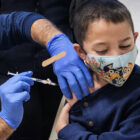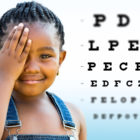Nearly 40% of preschool-aged children nationwide have never had a vision screening, new data suggests, and there are disparities in who has been tested. During 2016 and 2017, only 63.5% of children 3 to 5 years old had their eyes tested by a doctor or other health professional, and whites were more likely to have been tested than blacks and Hispanics, according to data from the Centers for Disease Control and Prevention (CDC). Childhood vision screenings can lead to early detection of vision disorders. The United States Preventative Service Task Force, an independent panel of experts, and the American Optometric Association recommend children in that age group have their eyes checked at least once, even if they’re asymptomatic and at low risk for problems.
“The purpose of a screening is to pick up any red flags, warning signs or risk factors for vision problems,” said Dr. Caroline DeBenedictis, a pediatric ophthalmologist at Connecticut Children’s Medical Center in Hartford and an assistant professor at UConn School of Medicine. “Vision screening should be happening from the time [children] are born.”
Early detection plays a major role in improving outcomes, she added.


